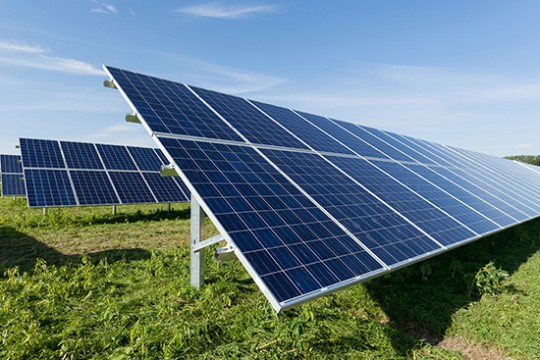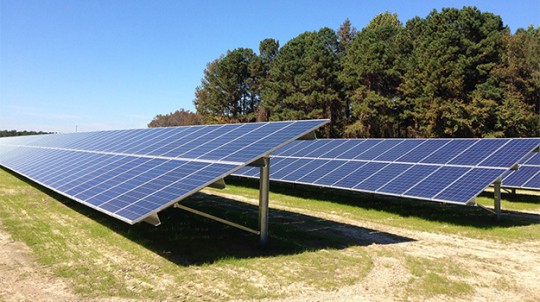Regulators Approve Gulf Power, Military Solar Plan
April 17, 2015
The Florida Public Service Commission on Thursday approved a plan that would lead to Gulf Power Company buying electricity from major new solar facilities on Northwest Florida military bases.
“Adding solar energy to our portfolio is another step in further diversifying our energy mix,” said Stan Connally, Gulf Power president and CEO. “Through careful planning, we’ve been able to work alongside our military partners to help provide cost-effective renewable energy — and all our customers will reap the benefit.”
The solar energy farms will be constructed at Eglin Air Force Base in Fort Walton Beach (30 megawatts), Naval Air Station Whiting Field, Outlying Landing Field Holley in Navarre (40 megawatts), and Naval Air Station Pensacola, Outlying Landing Field Saufley in Pensacola (50 megawatts).
 “We support this important partnership between Gulf Power and the U.S. Air Force and the U.S. Navy that will play a major role in Florida’s energy future,” Public Service Commission Chairman Art Graham said. “The solar facilities will diversify the utility’s power supply and increase Florida’s emissions-free electricity generation.”
“We support this important partnership between Gulf Power and the U.S. Air Force and the U.S. Navy that will play a major role in Florida’s energy future,” Public Service Commission Chairman Art Graham said. “The solar facilities will diversify the utility’s power supply and increase Florida’s emissions-free electricity generation.”
Gulf Power will serve customers across Northwest Florida with power from these renewable energy-generating facilities. Together, these new solar facilities, which will be developed by HelioSage Energy, could produce enough energy to power approximately 18,000 homes for one year.
As an intermittent energy resource, the solar farms will not replace Gulf Power’s generation plants, but will have the capability to provide energy that will diversify the power supply and provide a cost-effective alternative during peak energy usage.
Construction is scheduled to begin in February 2016 and the facilities are expected to be in service no later than December 2016.
The company’s first renewable energy project was the 3.2-megawatt Perdido Landfill Gas-to-Energy facility, which has produced more than 100 million kilowatt hours of electricity since starting commercial operation in 2010.
Gulf Power also submitted a request in February to the FPSC to approve an agreement that would make the utility a leading purchaser of wind generation among Florida utilities. If approved, this would bring the company to a total of five renewable energy sources.
Pictured: Examples of HelioSage Energy solar photovoltaic (PV) facilities. Courtesy photos for NorthEscambia.com, click to enlarge.
Comments
14 Responses to “Regulators Approve Gulf Power, Military Solar Plan”




Its sad that large areas of wildlife habitat have been destroyed and a major eyesore created all in the name of energy conservation. This is an agenda shoved down our throats by outgoing administration. Who is going to profit from this? I dont think it will be the consumer.
For an area that sorely trails behind other FL counties (and the country for that matter), this is definitely a positive move forward. Located onbase, the arrays will be physically protected and secured from those who oppose science and would prefer to burn car tires as an alternative. Smart meters, smart grid, and sustainable energy… We will accelerate into the future even if some have to be dragged while kicking and screaming about the “great evil” that rational people call “progress”.
Fred, A watt is a joule per second. A megawatt is a million joules per second. A 100 watt light uses a hundred joules/second. A 13 watt light uses 13 joules/second. Electrical energy is sold by the kilowatt-hour, thousands of joules/second for an hour, or 3600 seconds/hour times 1000 joules/second or 3.6 million joules.
There is now a new technology which allows glass windows to be used as solar panels in buildings. I would love to see this technology put in place to give customers an alternative to high electric bills. This would be a very good area for this.
Seems like the brown fields areas that are forever uninhabitable contaminated wasteland would be a better spot for solar arrays of this magnitude.
CHOMP CHOMP CHOMP….That’s the sound of GP in our pockets even more. I wonder if they will go before the PSC and figure out a way for ratepayers to build this…Oh wait we are….Just like WE paid for and OWN the lines that GP thinks tey own. That’s why we need another electric co here…GP is the MOST EXPENSIVE provider in the state…THe other two big power companies in Florida LOWERED RATES LAST YEAR, all while GP needed a RATE INCREASE…Will this LOWER our bill any or just mean MORE profits for GP stockholders?
Should coal no longer be available to fire up the big plant, solar could keep emergency facilities running IF the gas and oil powered generators cannot be refilled. ENDLESS supply of sun…well, at least usually.
Gulf Power, how will solar enhance your state of emergency plans?
REGARDING:
“Together, these new solar facilities, which will be developed by HelioSage Energy, could produce enough energy to power approximately 18,000 homes for one year.”
Just for one year?
Probably means the total energy would power the homes even though it goes everywhere and there are times when it is being used elsewhere and times when power has to come from elsewhere.
David for reliable, cheap, clean power
or any kind of power if that isn’t available
That’s right jeeperman, this way they get us coming & going, we pay for the solar stuff, (which will be gone the first hurricane) & then get charged for the power the solar stuff produces. LOL!
I seem to remember another solar stuff deal that involved a vanishing $500 million dollars a few years back, hmm…
30, 40 and 50 megawatts sounds impressive, but is that MW per hour? per day? These solar farms look real sci-fi, but they take up huge tracts of land and really don’t make that much of a dent in energy needs. How much do they cost to build and maintain? How long is the payback period when you finally save enough to make it a worthwhile investment?
@ Steve….
MUCH Agreed….our high school students could benefit greatly from having the career STEM students hands-on involved in this promising project.
Thoughts are that once installed with our kids learning the solar array will need to be maintained and cared for so why not have the folks from out of town come do the installation and training then have our local people continue the project.?
Could also be a great training exercise for our military as this would work great in places they are based where there is a large amount of sunlight.
Seeing many positive promises here….follow thru, Leadership, please.
@Jeeperman: I believe the thinking behind this is that the solar panel farm is a more efficient use of public lands funded by taxpayers, especially since the public receives the goods from the farm (electricity). Gulf Power makes money because they provide the infrastructure for the electricity to be used by the consumer.
I don’t have a dog in this hunt, but anything we can do to increase our independence from “one way” of doing things is good, in MHO.
GREAT for the out of town supply and contractors that come here. would be a great time to educate local people for the future.
So Gulf Power, a FOR PROFIT company, gets to use taxpayer provided facilities (land) to make electricity FOR PROFIT?
How come Gulf Power does not do this project(s) on THEIR OWN lands?
Or partner up with International Paper? Or any other land owner that is not owned by us taxpayers?